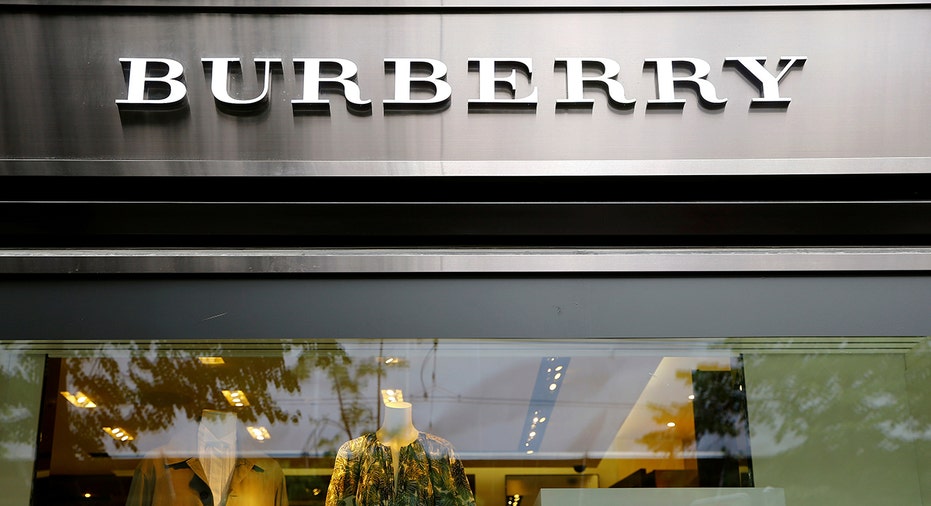Burberry ends bonfire of the luxuries after waste outcry

The logo of British luxury brand Burberry is seen at a shop at the Bahnhofstrasse in Zurich, Switzerland July 12, 2017. REUTERS/Arnd Wiegmann - RC12C4ABA410
Britain's Burberry will no longer burn unsold luxury goods to protect its brand after an admission that it destroyed almost $40 million worth of stock last year sparked a furor over waste in the fashion industry.
Burberry also said on Thursday it would no longer use real fur such as mink and racoon, in another step towards improving its social and environmental credentials which was immediately welcomed by animal rights campaigners.
The waste revelation in July from Burberry came only months after the owner of Cartier and Montblanc admitted to destroying some of their unsold watches and coincides with growing public awareness of waste and its environmental impact.
"Modern luxury means being socially and environmentally responsible," said CEO Marco Gobbetti, who is taking Burberry more upmarket. Its coats sell for more than 2,500 pounds ($3,234) and handbags are priced at up to 1,500 pounds.
Many retailers have been called out in recent years for destroying unsold stock, including by slashing or punching holes in garments before throwing them out.
Richemont, owner of luxury watch brands, said it bought back unsold stock from dealers during a recent downturn and recycled the precious metals and stones that were in the high-end pieces.
Burberry physically destroyed 28.6 million pounds worth of finished goods in the financial year to April, up from 26.9 million pounds the previous year, including 10 million pounds worth of beauty products such as perfume.
The products are generally those that did not sell via discount outlets and are more than five years old. Burberry said it would try to reuse, repair, donate or recycle its products while a strategy to make fewer, more targeted collections should help reduce excess stock.
It is also working with the sustainable luxury company Elvis & Kresse to transform 120 tonnes of leather offcuts into new products over the next five years.
GROWING AWARENESS
Exane BNP Paribas analyst Luca Solca said Burberry's announcement could put pressure on other luxury names to be more transparent about how they handle unsold goods.
"Concerns about sustainability are slowly but surely becoming more relevant for luxury goods consumers," he said.
Some luxury groups offer sales to employees and journalists to limit unsold stock. Both Kering, owner of Gucci and Alexander McQueen, and LVMH, owner of Louis Vuitton, Celine, Christian Dior and Givenchy, declined to comment.
Chanel said it did everything it could to avoid destroying stock, including selling items from previous collections to employees and partners, and starting production on goods once it has received orders from buyers.
The issue of excess stock is, in volume terms, a much bigger problem in the mass market, where retailers and consumers churn rapidly through different styles.
Greenpeace says 73 percent of textile fibers used to produce more than 100 billion garments each year end up in landfill or incinerators after they have been used.
H&M, the world's second-biggest fashion retailer after Inditex, has said in the past it burns stock, but only when it is damaged or, for example, has high levels of chemicals in it. At the end of May the Swedish group had $4 billon of unsold stock that it said it hoped to sell.
"Under no circumstances do we destroy clothes that are safe to use," a spokeswoman said. Britain's Primark said unsold products and samples were donated to charity.
Burberry is following the likes of Versace, Gucci and the trailblazer for ethical fashion, Stella McCartney, in removing real fur from its ranges.
The moves are part of a series of changes at Burberry where Gobbetti is pinning his hopes on new designer Riccardo Tisci to transform the quintessentially British fashion house. Former Givenchy star Tisci has previously designed costumes for Beyonce and Madonna and releases his debut collection in September.
"We are committed to applying the same creativity to all parts of Burberry as we do to our products," Gobbetti said.
PETA, the campaign group for the ethical treatment of animals, welcomed Burberry's move to stop using fur, which it said was a sign of the times.
"The few fashion houses refusing to modernize and listen to the overwhelming public opinion against fur are now sticking out like a sore thumb for all the wrong reasons," PETA's director of international programs, Mimi Bekhechi said.
Campaign group Humane Society International said animal charities would unite during this year's major fashion shows to call on Italian brand Prada to follow Burberry's lead.
The head of the International Fur Federation, Mark Oaten, said substituting natural fur with "plastic petroleum-based materials, like fake fur" was neither luxury nor responsible.
($1 = 0.7736 pounds)
(Additional reporting by Silke Koltrowitz, Anna Ringstrom and Pascale Denis; editing by Guy Faulconbridge and Alexander Smith)



















